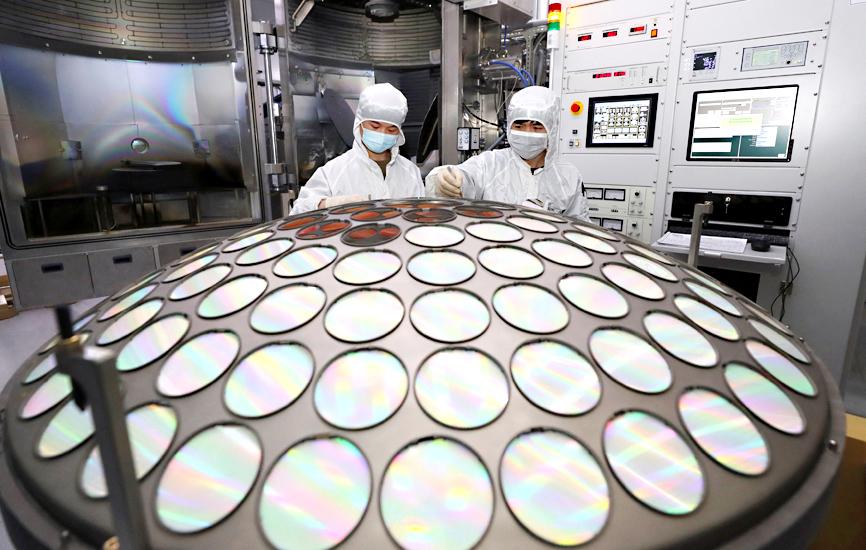The indefinite closure of 3M Co’s semiconductor coolant plant in Belgium could have major effects on the global semiconductor industry, in which Taiwan has a leading role, analysts said on Sunday.
The 3M plant in Zwijndrecht closed on March 8 due to tightened environmental regulations, a report on Friday in BusinessKorea magazine said.
Coolant prices have been rising since early this year due to high demand, and the Zwijndrecht plant reportedly accounted for 80 percent of global semiconductor coolant output, analysts said.

Photo: Reuters
3M on March 18 sent an official notice to its clients including Samsung Electronics Co, SK Hynix Inc, Intel Corp and Taiwan Semiconductor Manufacturing Co (台積電), the magazine said.
Citing industry sources, the magazine said that 3M’s customers could manage for one to three months with their current coolant inventories, which are essential for semiconductor etching.
Unless the situation is resolved, the global semiconductor manufacturing sector is likely to be significantly affected, the report said.
BusinessKorea said the Belgian government’s regulations were related to the emission of perfluoroalkyl and polyfluoroalkyl substances (PFAS), known for their nonstick and water-resistant properties and which have long been used in products from fabric protectors to firefighting foam.
PFAS, a controversial class of chemicals that 3M pioneered decades ago, has been linked to significant health risks, including certain types of cancer, according to news reports.
Separately, Spain plans to invest 11 billion euros (US$12.1 billion) to develop microchips and semiconductors as part of a series of strategic projects to overhaul its economy, Spanish Prime Minister Pedro Sanchez said.
“We want our country to be at the vanguard of industrial and technology progress,” Sanchez said yesterday in Madrid, without giving more details.
Sanchez said the project would soon be approved by his Cabinet.
Policymakers across Europe are racing to enact plans to invest in chips and cut reliance on imported technology. The EU aims to become a key semiconductor manufacturer with a goal of producing 20 percent of the world’s chip supply by 2030. The commission also freed up public funding for the production of chips considered “first of a kind” in Europe with its 45 billion euro Chips Act last month.
Germany is looking to grant Intel 5 billion euros in public funds to help finance a 17 billion euro semiconductor plant, people familiar with the matter said last month.
Additional reporting by Bloomberg

Sweeping policy changes under US Secretary of Health and Human Services Robert F. Kennedy Jr are having a chilling effect on vaccine makers as anti-vaccine rhetoric has turned into concrete changes in inoculation schedules and recommendations, investors and executives said. The administration of US President Donald Trump has in the past year upended vaccine recommendations, with the country last month ending its longstanding guidance that all children receive inoculations against flu, hepatitis A and other diseases. The unprecedented changes have led to diminished vaccine usage, hurt the investment case for some biotechs, and created a drag that would likely dent revenues and

Macronix International Co (旺宏), the world’s biggest NOR flash memory supplier, yesterday said it would spend NT$22 billion (US$699.1 million) on capacity expansion this year to increase its production of mid-to-low-density memory chips as the world’s major memorychip suppliers are phasing out the market. The company said its planned capital expenditures are about 11 times higher than the NT$1.8 billion it spent on new facilities and equipment last year. A majority of this year’s outlay would be allocated to step up capacity of multi-level cell (MLC) NAND flash memory chips, which are used in embedded multimedia cards (eMMC), a managed

CULPRITS: Factors that affected the slip included falling global crude oil prices, wait-and-see consumer attitudes due to US tariffs and a different Lunar New Year holiday schedule Taiwan’s retail sales ended a nine-year growth streak last year, slipping 0.2 percent from a year earlier as uncertainty over US tariff policies affected demand for durable goods, data released on Friday by the Ministry of Economic Affairs showed. Last year’s retail sales totaled NT$4.84 trillion (US$153.27 billion), down about NT$9.5 billion, or 0.2 percent, from 2024. Despite the decline, the figure was still the second-highest annual sales total on record. Ministry statistics department deputy head Chen Yu-fang (陳玉芳) said sales of cars, motorcycles and related products, which accounted for 17.4 percent of total retail rales last year, fell NT$68.1 billion, or

In the wake of strong global demand for AI applications, Taiwan’s export-oriented economy accelerated with the composite index of economic indicators flashing the first “red” light in December for one year, indicating the economy is in booming mode, the National Development Council (NDC) said yesterday. Moreover, the index of leading indicators, which gauges the potential state of the economy over the next six months, also moved higher in December amid growing optimism over the outlook, the NDC said. In December, the index of economic indicators rose one point from a month earlier to 38, at the lower end of the “red” light.